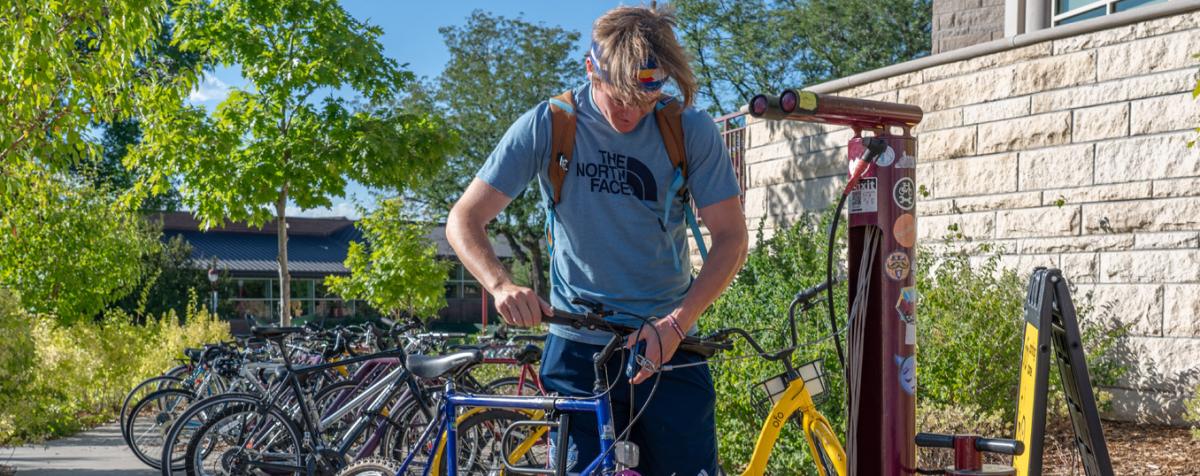Living Sustainably
Living a more sustainable lifestyle reduces your impact on the environment and increases the quality of life for you and the rest of your community. By riding a bike, walking or using public transit, you improve air quality and public health, reduce congestion on our roads and get exercise, reducing stress while benefiting your body and mind. By shopping with small, local businesses, you are reducing carbon emissions from shipping, often getting more unique and high-quality products, and helping to stimulate the local economy.
The University of Denver works hard to provide programs that make it easier, cheaper and more convenient to make sustainable choices and improve basic quality of life (yours and others). We are committed to providing resources to empower you to make daily choices that can have a positive impact on your community and the environment.
Recreation & Transportation
-
Playing Outside
Many people are drawn to DU because of its proximity to the Rocky Mountains. We offer programs that can help you get to the mountains safely, quickly and at a lower cost than driving your car up I-70 on a weekend.
Every winter quarter, DU Alpine Club teams up with The Center for Sustainability and USG SusCom to offer Ski Bus. The Ski Bus travels to different mountains every Saturday and Sunday and provides an affordable round-trip ride to both IKON and EPIC pass mountains. Tickets are $10 for Alpine Club members and $15 for non-members and include breakfast. Instead of sitting in traffic on your way to and from the slopes, spend your commute chatting with your friends, taking a nap or working on your coursework. Sign up for a trip here.
If you want to explore other adventures the mountains hold, check out the DU Gear Garage, managed by the DU Center for Sustainability. The Gear Garage offers affordable rentals of camping and other outdoor gear to anyone in the DU Community. For beginners to the outdoors, the Gear Garage also offers free guided day hikes during every quarter (the winter quarter hike is on snowshoes). For a full list of gear available and instructions on how to use the Gear Garage, check out their website or email geargarage@du.edu.
-
Bus & Light Rail
Every undergraduate student at the University of Denver, as well as many graduate students, receive an RTD College Pass, paid for by their student fees. Additionally, every full-time staff and faculty member at DU receives an RTD EcoPass. These passes gives you unlimited access to Light Rail and bus services around Denver, Boulder and the US-36 corridor, including service to the airport.
The light rail services key destinations around Denver — many of which are an expensive hassle to park at — such as the Pepsi Center, the Denver Convention Center, the Denver Performing Arts Complex, Denver International Airport and Coors Field. Skip the frustration of driving through traffic and finding parking near your destination, and make use of your RTD pass instead!
See the Parking and Mobility services website for more information about your RTD pass.

Sustainable Eating
-
Food Security
According to the 2021 #RealCollege survey, nearly 29 percent of college students face food insecurity every month. For some, that is a one-time occurrence during an emergency. For others, this is a chronic condition that affects their lives throughout their time at school. It should be no surprise that students who are hungry or stressed about where their next meal will come from have a harder time succeeding in the classroom. DU offers a variety of resources to students in order to alleviate food insecurity and improve the quality of life for hungry students.
The DU Food Pantry provides free food to anyone on the DU campus experiencing food insecurity. Users can take one bag of food per week as a supplemental food source. Drop-in hours are Tuesdays 4-8 pm, or by appointment. Check out the Food Pantry website for more details or reach out to foodpantry@du.edu to schedule an appointment.
Denver Dining by Sodexo also offers the Swipe Out Hunger Program, which allots free dining hall meals to students struggling with food insecurity. Meals can be accessed through a referral from Student Outreach and Support. The SOS office also offers a variety of other resources and information for students struggling with a variety of issues from hunger and homelessness to stress and classroom success.
-
Local Foods
The average plate of food travels 1,300 miles from where it was produced to your mouth. The global food system encourages the growth of lower-quality foods that can be produced on plantations that threaten rain forests, wildlife and biodiversity. Locally grown and produced foods give you the amazing opportunity to meet and directly support the humans who grow your food, explore new and interesting food choices, and eat fresher, higher quality foods that spent a lot less time getting from the farm to your plate.
We work hard to bring local foods to campus so that everyone who eats at DU can reap the benefits of the amazing produce and food products grown and made in Colorado. In the dining halls, local foods are identified so that students can choose local whenever they eat. Twenty percent of dining hall foods are from local and sustainable sources, and we are actively working to increase that amount.
The DU Center for Sustainability partners with The GrowHaus to provide weekly local food boxes. These boxes help GrowHaus advance their mission to build food security and food justice in the Elyria-Swansea neighborhood of north Denver, one of the most vulnerable communities in our city. Food boxes are a great, affordable way for students, faculty and staff to access local eggs, bread and produce. Order yours here.
If fruit is your preference, the Center for Sustainability also works with Ela Family Farms to bring community supported agriculture (CSA) to DU. Check the Ela website in May or June to sign up for your share, and get fresh, delicious fruit from the Colorado Western Slope all autumn long. The upfront cost can seem high, but the volume of fruit you receive makes this a great value.
Every February, the DU Center for Sustainability also hosts the annual Local Market, which seeks to highlight local foods — baked goods, cheeses, snacks, sauces, pastas, teas and many other items — from producers who are not farmers who are bringing diversity and creativity to the Denver food scene, and which offer delicious alternatives to what you find at the grocery store.
Reducing Waste
-
Reduce and Reuse
Nearly everything we consume each day comes with some kind of waste. Even when that waste is recycled or composted, it takes a toll on the environment and the health of our society. The best way to reduce that toll is by reducing the waste you create in the first place: find ways to reuse items and extend their lifetimes and think creatively and intentionally about how to avoid creating waste products with your purchases and everyday decisions.
There are tons of ways to do this, and it is a great way to expand your creativity and think about your life in a new and exciting way. For example, clothing that fits poorly, has gone out of fashion, or is somehow damaged can be adjusted, upcycled, or repaired - all ways that can extend that piece's life without going to a landfill or a charity that may not be able to sell it. A glass bottle from your kitchen can become a pot for a houseplant, a water bottle, or part of your next art project. At the grocery store, you can look for products that come in recyclable, compostable, or reusable packaging, rather than materials that must go to the landfill.
Making these changes takes some creativity, forethought, and skill, but they can have a huge impact on how you see the world and the impact you have in it.
-
Recycling
When an item can't be reused, recycling is a great option. Recycling allows for materials to get a new life as another product, rather than forcing us to create materials from virgin resources - something that is resource intensive and tends to have a huge impact on the environment from which those resources come.
But recycling is not always as straightforward as it seems like it should be, so being familiar with local recycling rules is just as important as the act itself. Every municipality has slightly different recycling rules which are dependent on a variety of factors - the machinery at the sorting facility, whether there are buyers for the sorted materials, and whether there are safe ways to store materials until they can be purchased and shipped. Having different rules in each city can make it challenging to get recycling in a new place, but luckily, the City of Denver has put together some helpful resources to make it easier than ever to do it right.
Check out Denver's Recycling Directory to help you figure out the best ways to recycle just about any household item.
-
Composting
According to the Natural Resources Defense Council (NRDC), nearly 40% of all food produced in the US is thrown away every year. This is along every part of the food production line - from fruits and vegetables that rot in the fields where they were grown, to foods lost in transit to distribution centers, to foods that go bad on grocery store shelves, and food that rots inside of your refrigerator. You have the opportunity to reduce that waste in your own home, while creating a valuable resource for the next season of growing food - compost!
Compost is a process by which organic materials such as food waste, yard waste, and even paper products, are put under heat and pressure in order to break them down and create soil. This soil is rich in nutrients and can be a wonderful fertilizer in your garden, on a farm, or even for the trees and bushes in your neighborhood.
Composting can be done at many scales - from a small backyard compost project all the way to industrial facilities that process thousands of pounds of waste each day. Different materials can be accepted depending on the type of composting process the materials will undergo, with more materials being accepted the larger the composting facility is. In Denver and at DU, we have access to industrial composting facilities that are able to process a huge number of materials: food scraps, coffee grounds, dairy products, bones, tissues, and any plate, cup, fork, or other service-ware that is labeled as "compostable."
Want to start composting but unsure what can go in your bin? Check out the City of Denver's composting guide. Want to compost but don't have access to the City's program? You can join Crimson Compost - DU's own composting program for people living in residence halls and apartments.








